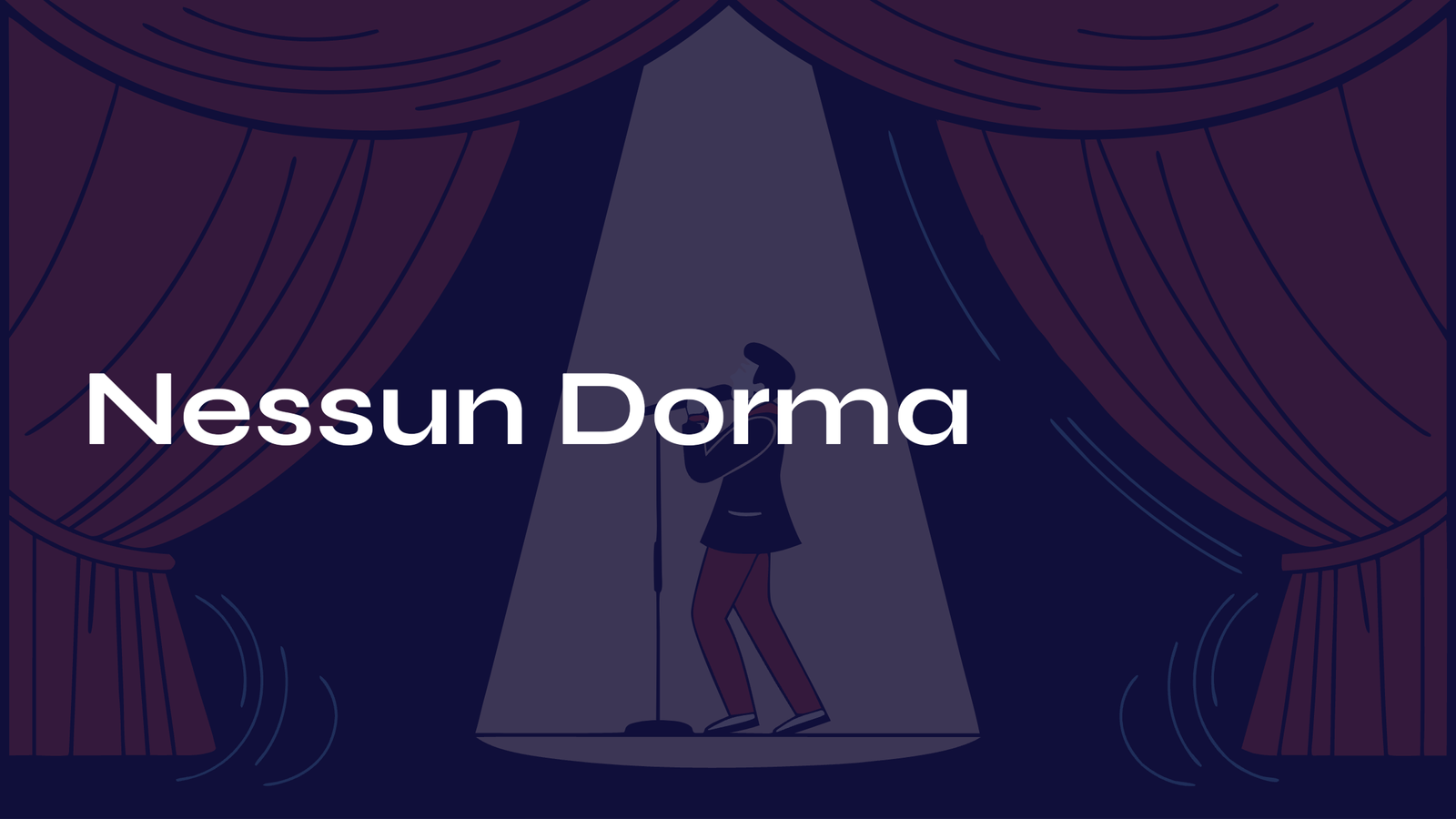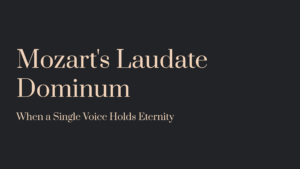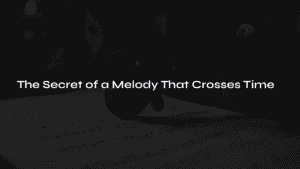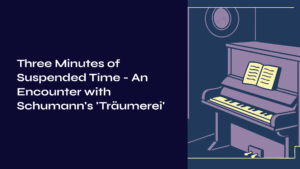Table of Contents
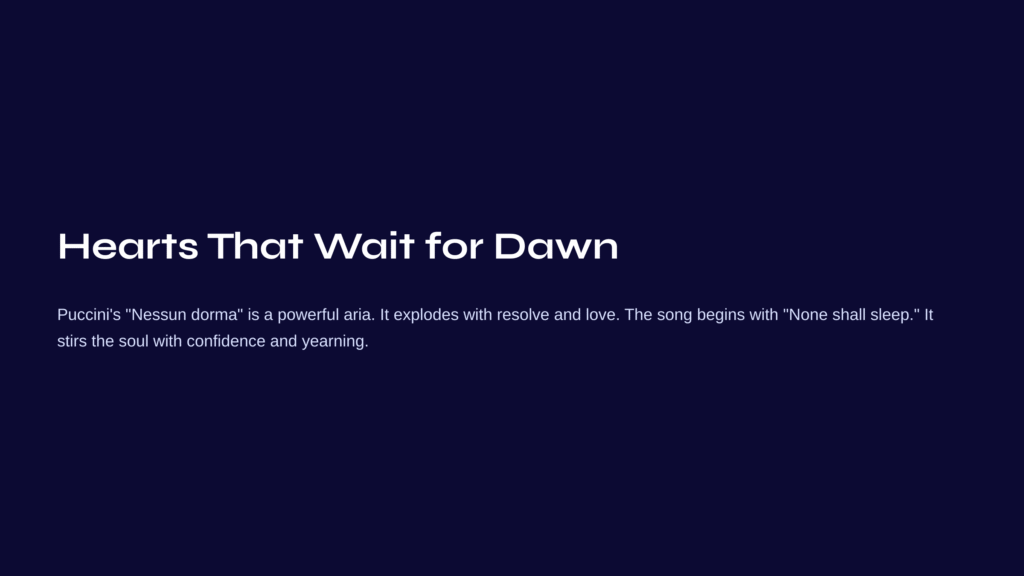
Hearts That Wait for Dawn
Some music touches the deepest corners of our hearts from the very first hearing. Like awakening something long forgotten, an inexplicable thrill envelops our entire being. Puccini’s “Nessun dorma” is precisely such a piece. In just three minutes, this aria explodes with one man’s unwavering resolve and profound love, making listeners feel as though they too are waiting for that dawn.
Beginning with the declaration “None shall sleep,” this song carries something sublime. Confidence in victory and yearning for love merge together, stirring the listener’s soul. I want to gradually unravel why this has become one of the world’s most cherished operatic arias.
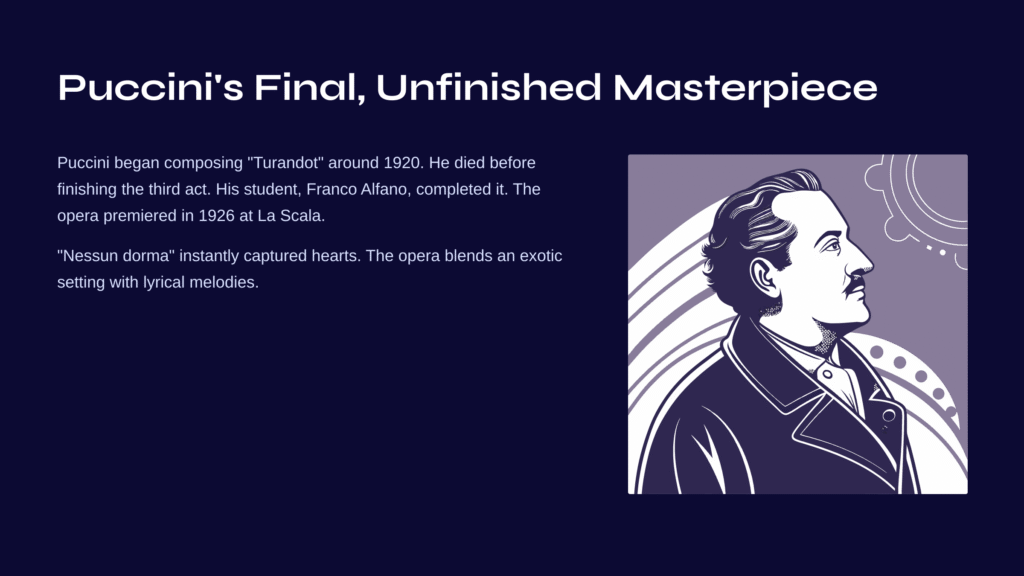
Puccini’s Final Masterpiece and Its Unfinished Beauty
Around 1920, Giacomo Puccini began composing “Turandot” based on Carlo Gozzi’s play set in China. But fate would not grant him time to complete this work. Puccini died in 1924, leaving the third act unfinished, and his student Franco Alfano completed the work based on his sketches.
“Turandot” premiered on April 25, 1926, at Milan’s La Scala. On that night when Toscanini held the baton, audiences held their breath at the magnificence of Puccini’s final work. Particularly, “Nessun dorma” resonating in the third act instantly captured the hearts of all who heard it.
This opera represents an exquisite fusion of exotic Oriental atmosphere set in Beijing with Puccini’s characteristic lyrical melodies. The story of the ruthless Princess Turandot and Prince Calaf who falls in love with her presents a unique narrative born at the intersection of East and West.
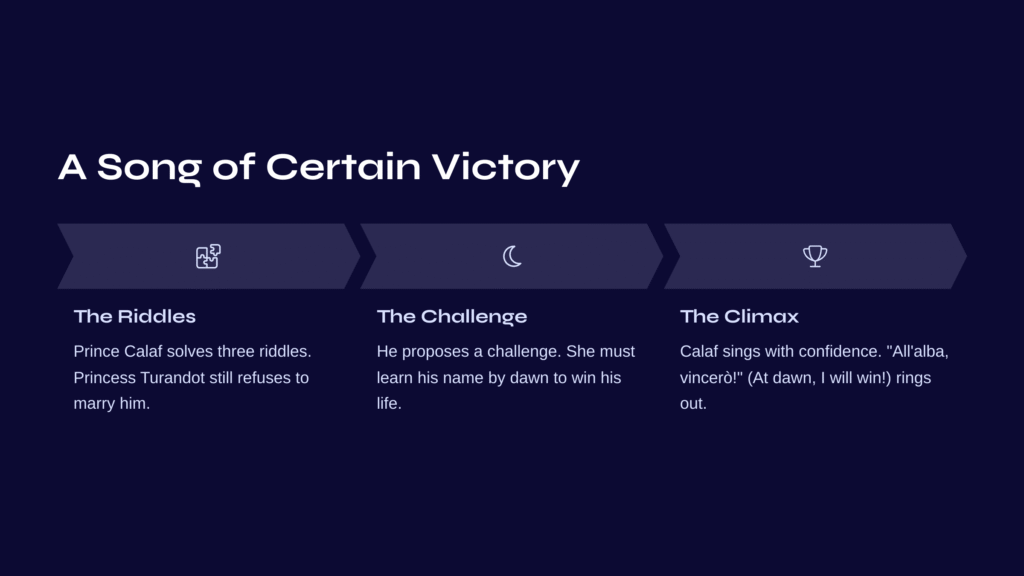
A Man’s Song of Certain Victory in the Deep Night
“Nessun dorma! Nessun dorma!” Thus begins the aria. This declaration, “None shall sleep,” creates a powerful impression when combined with the dramatic situation. Prince Calaf has solved all three riddles posed by Princess Turandot, yet she still refuses to marry him. So the prince makes a counter-proposal: if she can discover his name before dawn, he will gladly forfeit his life.
The princess commands all the people in the city: stay awake until dawn and find out that stranger’s name. If they fail, everyone will face death. In this desperate situation, Calaf actually sings this aria with confidence in his victory.
The music begins quietly and mysteriously. In “Ma il mio mistero è chiuso in me” (But my mystery is locked within me), the prince’s inner conviction emerges. The distant women’s chorus (“Il nome suo nessun saprà” – No one shall know his name) resonates mysteriously like the voice of fate itself.
Then finally comes the climax. “Dilegua, o notte!” (Vanish, O night!) At this moment, the tenor’s voice soars skyward. “All’alba, vincerò! Vincerò! Vincerò!” (At dawn, I will win! I will win! I will win!) The three repetitions of “I will win” are not mere cries, but the very essence of human will confronting destiny.
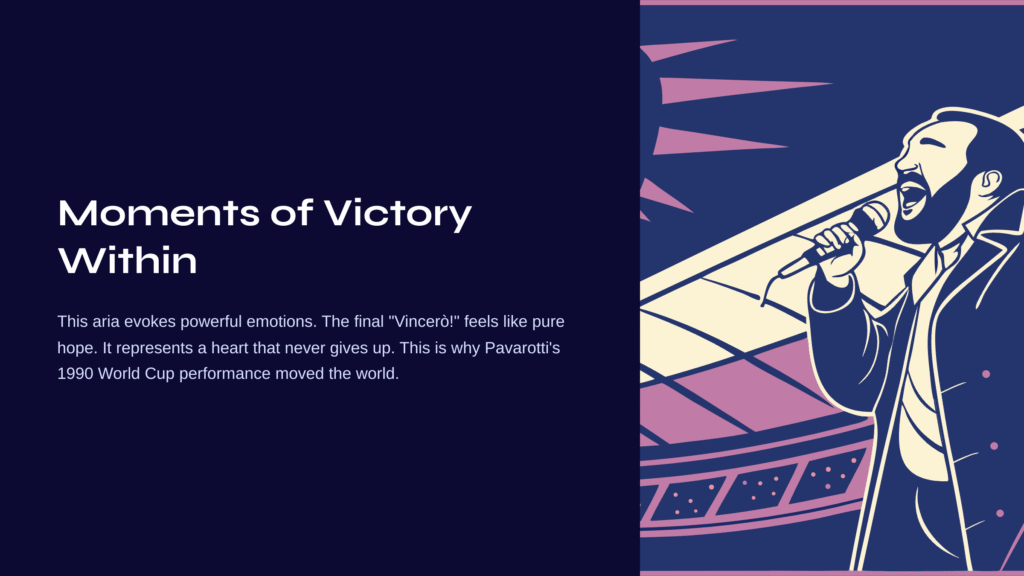
Moments of Victory Within My Heart
Every time I listen to this aria, I’m swept by strange emotions. When the prince’s confident voice rings out, it feels as though any fears within me also disappear. Especially in the final “Vincerò!” section, when the tenor extends from B♭4 to A4 and holds it long, there’s something in that sound beyond mere technique.
It’s perhaps the purest form of hope humans can possess. A heart that never gives up even in desperate situations, the belief that one can endure any trial for a loved one. In these brief three minutes, we experience such sublime emotions completely.
This might explain why the whole world was moved when Pavarotti sang this aria at the 1990 World Cup. In the arena of sports competition, this aria singing of desperate longing and confidence in victory delivered a more powerful message than any fight song could.
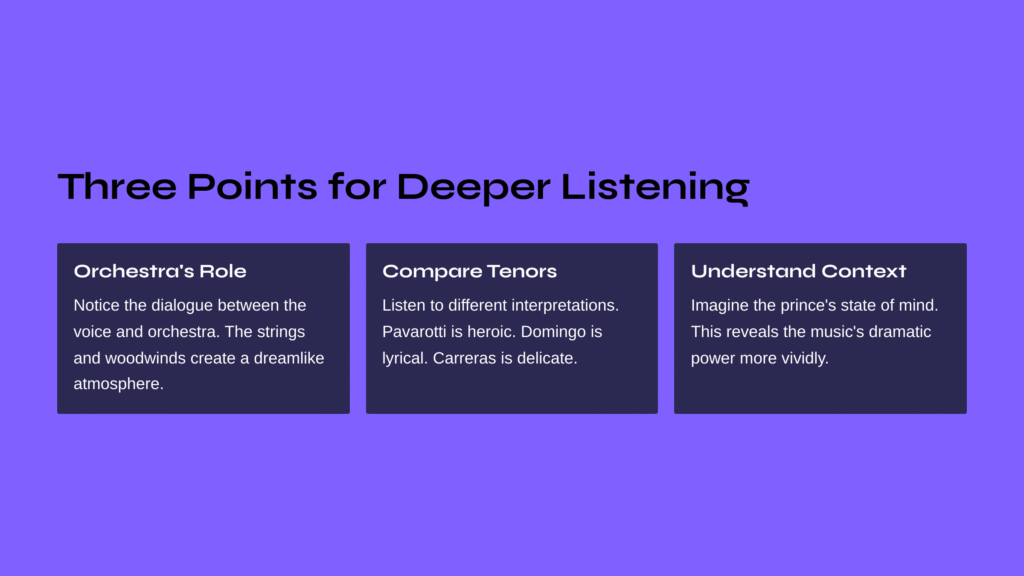
Three Points for Deeper Listening
First, pay attention to the orchestra’s role. Puccini delicately designed the tenor’s voice and orchestra to dialogue with each other. Particularly when the women’s chorus is heard in the middle section, the dreamlike atmosphere created by the strings and the lyrical melody of the woodwinds give a sensation of moving between dream and reality.
Second, don’t miss the joy of comparing different tenors’ interpretations. While Pavarotti’s version emphasizes confident heroic aspects, Plácido Domingo shows a more lyrical and emotional approach. José Carreras excels in delicate emotional expression. Experiencing how each artist’s personality emerges so differently in the same piece is fascinating in itself.
Third, try to understand this aria within the context of the opera. Don’t just listen to it as a beautiful melody, but imagine why the prince sings this song at this moment and what his psychological state might be. This way, you can feel the dramatic power the music conveys more vividly.
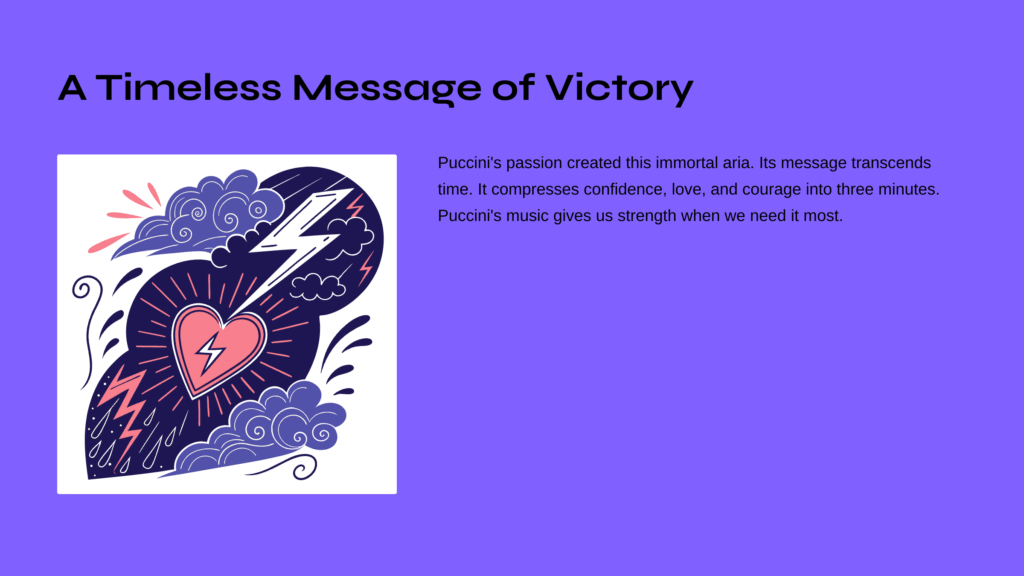
A Timeless Message of Victory
Puccini clung to this work until just before his death. The passion he poured into “Turandot” bore fruit as the immortal aria “Nessun dorma.” The reason this song still moves people worldwide after 100 years is that its message transcends time.
Confidence in victory, devotion to love, courage to face destiny – all of these are compressed into three short minutes. Whatever era we live in, whatever situation we face, we sometimes need such unwavering will. And Puccini’s music becomes our strength precisely in those moments.
When night deepens, listen to this aria. When the tenor’s voice cries “Vincerò!”, you’ll surely feel like you too can achieve victory. That’s the magic music provides, and the most precious gift Puccini left us.
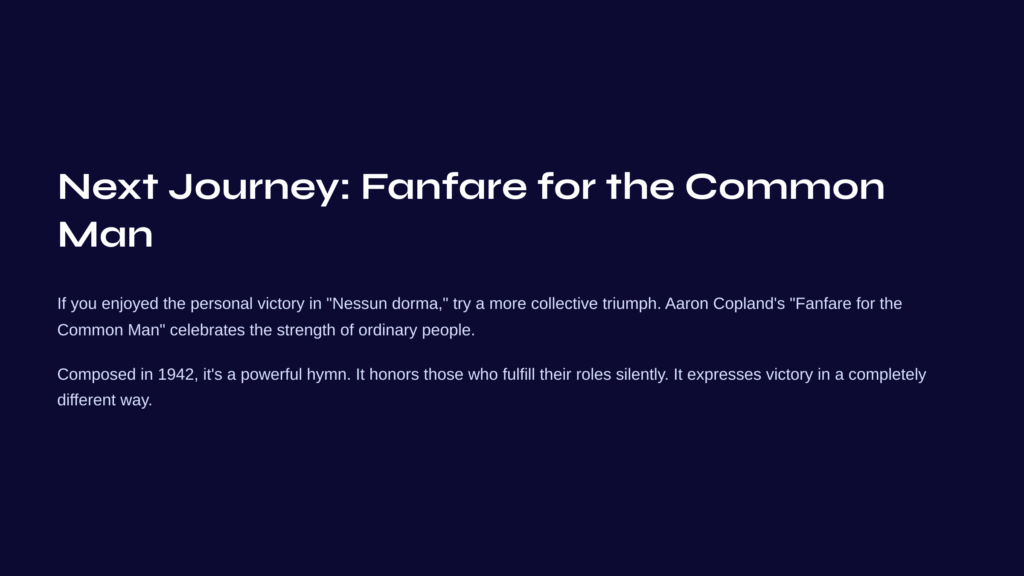
A Suggestion for Your Next Journey: Copland’s “Fanfare for the Common Man”
If Puccini’s personal and lyrical victory resonated in your heart, how about listening to a more magnificent and collective sound of triumph? Aaron Copland’s “Fanfare for the Common Man” celebrates the dignity and strength of all ordinary people on a completely different dimension from the prince’s personal struggle.
Composed in 1942 during World War II, this work is a short, powerful fanfare performed only by brass and percussion instruments. While Puccini’s aria sang of personal devotion for one beloved person, Copland created a hymn for all ordinary people who silently fulfill their roles on battlefields, in factories, and in daily life. This music, created by the clear declaration of trumpets and the resounding power of timpani, expresses the emotion of “victory” in a completely different way.
From an individual’s heroic moment to community solidarity, from lyricism to grandeur – through such contrasts, you can experience how broad the emotional spectrum that classical music can contain truly is.
